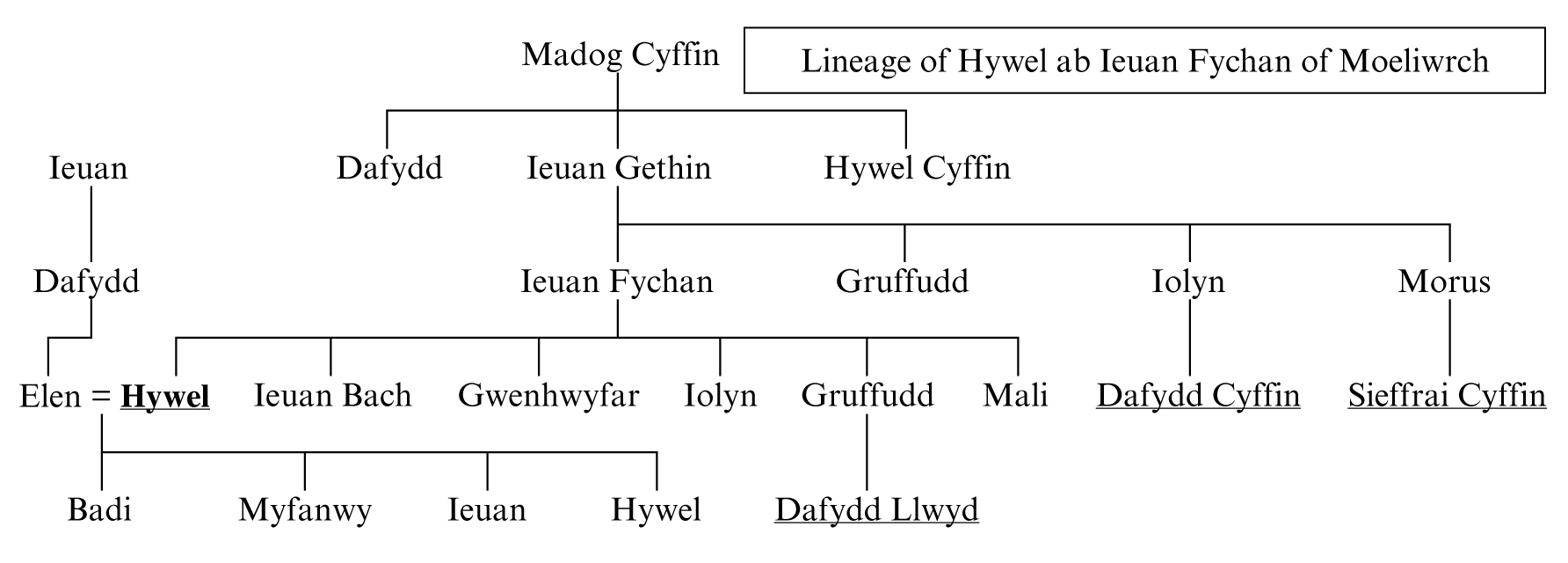Guto states that he had composed thirteen poems for Hywel ab Ieuan Fychan (91.47–8), yet only three very notable poems survive in the manuscripts:
- a poem on rebuilding Moeliwrch (poem 90);
- a poem of praise (poem 91);
- a poem to heal Hywel’s knee (poem 92).
The only other extant poem for Hywel, also on rebuilding Moeliwrch, was composed by Ieuan ap Gruffudd Leiaf (Huws 2007: 127–33). Hywel Cilan composed a poem of praise for two of Hywel’s sons, Ieuan and Hywel (GHC poem XV). The brother of Hywel’s grandfather, Hywel Cyffin, dean of St Asaph, was one of Iolo Goch’s patrons (IGP poem 19).
Lineage
The genealogical table below is based on WG1 ‘Aleth’ 1, ‘Bleddyn ap Cynfyn’ 9, 10, 11; WG2 ‘Bleddyn ap Cynfyn’ 10C. Hywel Cilan’s poem for two of Hywel’s sons is the only evidence that he had a son named Hywel. The names of Guto’s patrons are underlined.

Lineage of Hywel ab Ieuan Fychan of Moeliwrch
According to Bartrum’s genealogies, Hywel was Ieuan Fychan’s son from his first marriage to Gwenhwyfar daughter of Hywel. Ieuan Fychan married three times, his second and third wives being Gwenhwyfar daughter of Ieuan and Tibod daughter of Einion, and Gruffudd, father of Dafydd Llwyd of Abertanad (Hywel was his uncle), was born from the third marriage. Furthermore, Hywel’s grandfather, Ieuan Gethin, was married at least three times, and Ieuan Fychan was a half-brother to both Iolyn and Morus, fathers of two of Guto’s other patrons, namely Dafydd Cyffin of Llangedwyn and Sieffrai Cyffin of Oswestry. Both Dafydd and Sieffrai were Hywel’s cousins.
His family and career
Hywel was related to an extended family that exerted substantial influence in the Marches west of Oswestry during the fifteenth century. Many of the region’s great houses were either owned by one of Ieuan Gethin’s numerous descendants or had family connections with them. The princes of Powys were among Ieuan Gethin’s most notable ancestors and the custom of giving poetic patronage had been honoured in Powys Fadog for centuries (on their arms, see DWH i: 105–6, ii: 93).
One Yeuan Gethin was recorded as an archer in John duke of Lancaster’s army between 1372 and 1374 (TNA E101/32/26). The court of Moeliwrch on the eastern slopes of Y Gyrn near Llansilin may have been built by Ieuan Gethin himself towards the end of the fourteenth century (Huws 2001: 12; 2007: 106–7, 113–14). His son, Ieuan Fychan, was old enough to hold offices in the lordship of Chirk during the last two decades of the fourteenth century, such as the beadle of the commote of Cynllaith in 1386–7 and the chief forester of the commote between 1390 and 1392 (ibid. 97). In 1386 an assessment was made of Ieuan Gethin’s movable property, along with his brother Dafydd’s and both his sons’, Ieuan Fychan and Gruffudd (of Lloran Uchaf), and Ieuan Gethin’s name appears on another document in the same year as one of four men ordered to arrest one Dafydd Fychan ap Dafydd (ibid. 98–9, 117). By 1397–8 Ieuan Fychan was chief justice of the commote and his brother, Gruffudd, was the beadle of the commote of Mochnant, an office which Ieuan also may have held at one time (ibid. 100; on Morus, his other brother, see Sieffrai Cyffin).
The family’s power and influence was on the increase in 1400 when they threw in their lot with their close neighbour, Owain Glyndŵr, in his great revolt, and their resistance towards the Crown may have stemmed in part from their unease with much of what was expected of them in their positions of local power (Huws 2007: 100). Ieuan Fychan and Gruffudd his brother were present in Glyndyfrdwy on 15 September 1400 when Glyndŵr was proclaimed Prince of Wales. Huws (2001: 7) argues that they remained loyal to the cause for some years, possibly until 1407 (Huws 2007: 100–1). Ieuan Fychan’s land and property was forfeit in 1400 for supporting Glyndŵr (it seems that he was the beadle of Abertanad at the time, HPF iv: 194, vi: 126–7), and it is likely that his court at Moeliwrch was burnt to the ground in May 1403, when an English army came to Wales to destroy both of Glyndŵr’s homes at Sycharth and Glyndyfrdwy (Huws 2007: 106). However, Ieuan Fychan evidently succeeded in repossessing his lands soon after the failure of the revolt as he is named as one of the chief justices of the commote of Mochnant in 1408–9 and, in 1416–17, as one who attained the lands of one Einion Talbant in the same commote (ibid. 100; 2001: 7).
His son Hywel’s name appears in 1408–9 as one of two justices in Cynllaith and in 1416–17 as the beadle of the commote (ibid. 7–8; 2007: 100). If Hywel was old enough to hold office in 1408, it is likely that he was over forty years old when Guto began his career as a poet in the 1430s, and his poetry for Hywel may belong to the period c.1430–50. Guto’s poem on rebuilding Moeliwrch shows that it was Ieuan Fychan who began that work and that Hywel completed it. It seems that the poets referred to Hywel’s wife as Elen Felen o Foeliwrch ‘Yellow-haired Elen from Moeliwrch’ (92.25n Elen). Guto’s association with Moeliwrch was renowned among poets who found patronage there during the second half of the sixteenth century, such as Huw Arwystl (Huws 2007: 123–4).
Bibliography
Huws. B.O. (2001), ‘Y Bardd a’i Noddwr yn yr Oesoedd Canol Diweddar: Guto’r Glyn a Hywel ab Ieuan Fychan o Foeliwrch’, G.H. Jenkins (gol.), Cof Cenedl XVI (Llandysul), 1–32
Huws. B.O. (2007), ‘Ailadeiladu Bywyd ar ôl Gwrthryfel Glyndŵr: Tystiolaeth y Canu i Foelyrch’, Dwned, 13: 97–137





